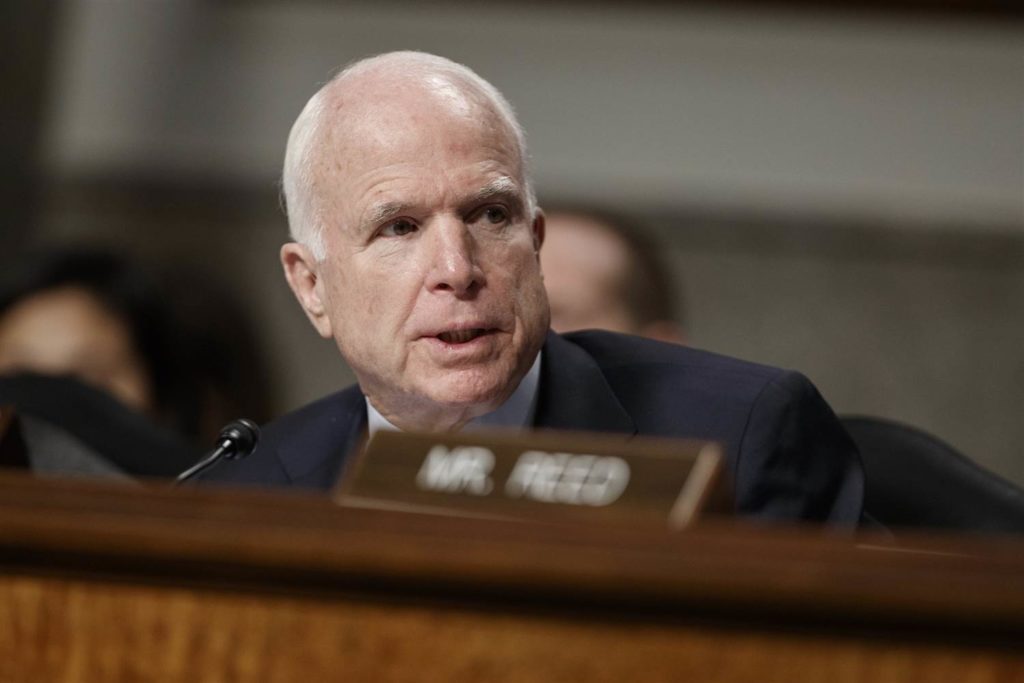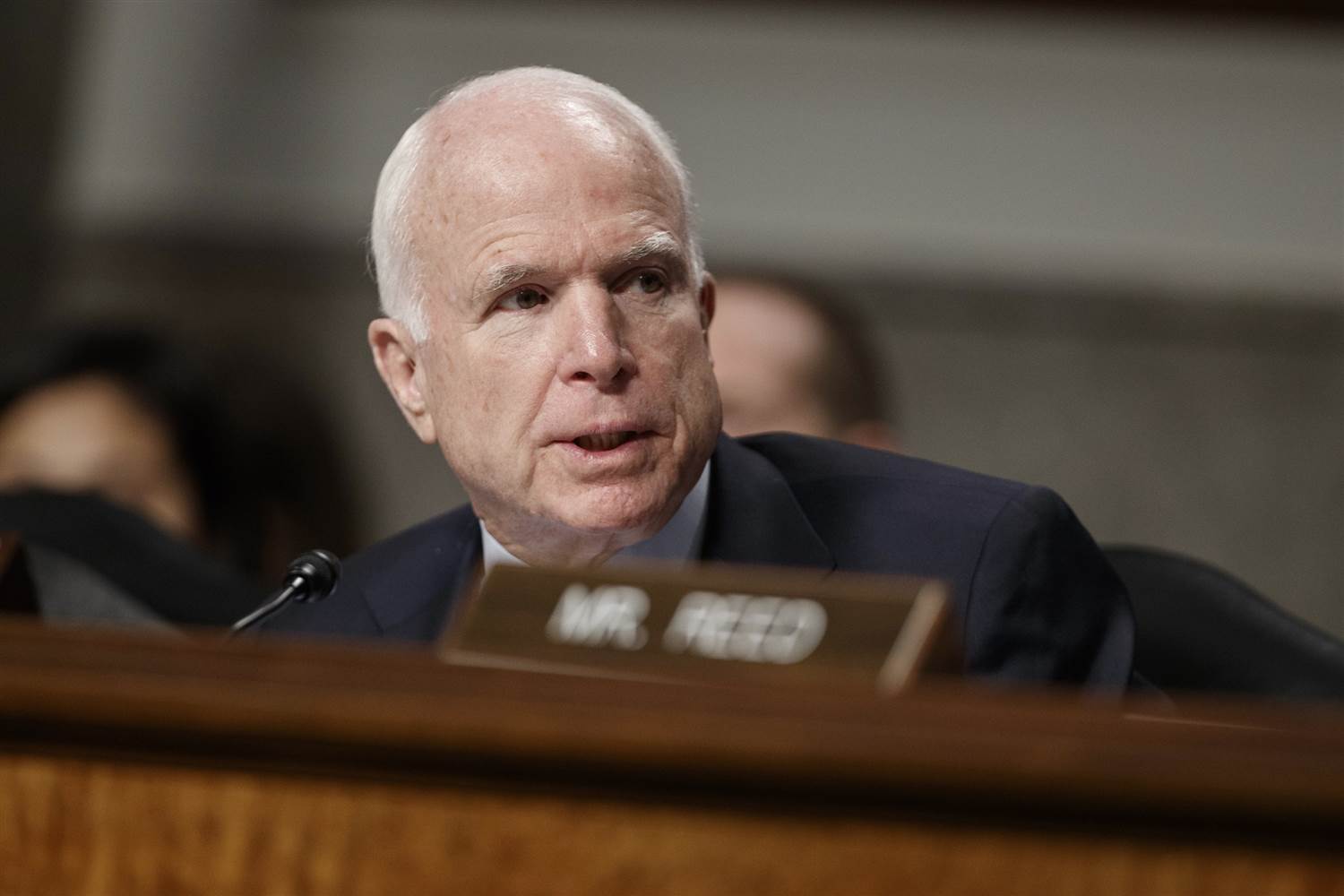There have been many issues on which I have disagreed with Senator John McCain. However, I respect the Arizona Republican for one simple reason: I trust him; I trust that he acts in the best interests of the country, not his own.

Last week, when it was announced that McCain had brain cancer, I was stunned not because such a life-threatening complication would, more than likely take him from this earth, but because without his truth-telling sagacity this country will be poorer for his loss.
When he announced his run for president in 2007, McCain said, “I’m not running for president to be somebody, but to do something; to do the hard but necessary things, not the easy and needless things.”
McCain went on to challenge Barack Obama for the presidency and while the maverick senator picked a shoot-from-the-lip, un-informed Sarah Palin as his running-mate, he demonstrated the integrity and respect he has long been known for by standing up to a supporter in a bigoted attack against his opponent.
“I can’t trust Obama,” the supporter said, “he’s an Arab.”
Without a pause, McCain took the microphone back and politely said, “No ma’am. He’s a decent family man, a citizen that I just happen to have disagreements with on fundamental issues, and that’s what this campaign is all about.”
Two weeks ago (July 9), McCain was on the CBS news program Face the Nation, hosted by John Dickerson. Take a look at the unequivocal, and wry straight-talking McCain in answering a question on the issue of the moment.
JOHN DICKERSON: So what happens now on health care?
McCAIN: I think my view is it’s probably going to be dead, but I’ve been wrong. I thought I’d be president of the United States. …I fear that it’s going to fail. And then we should convene a Republican conference, say, “What are we going to do?” Introduce a bill. Say to the Democrats, “Here’s a bill.” It doesn’t mean they control it. It means they can have amendments considered. And even when they lose, then they’re part of the process. That’s what democracy is supposed to be all about.
That’s one side of John McCain. Another, tougher side showed up when, on the same show, Dickerson asks McCain about sanctions against the Russian government for interfering in our 2016 election.
DICKERSON: …the U.N. ambassador said… “Don’t think this is over.” And she suggested consequences could come. But the president this morning is tweeting… “Now it is time to move forward in working constructively with the Russians.” That seems to suggest no consequences.
McCAIN: …we know that Russia tried to change the outcome of our election last November. And they did not succeed. …So if you were Vladimir Putin, who I’ve gotten to know over the years, you’re sitting there and you got away with literally trying to change the outcome not just of our election. French election. Tried to overthrow the government of Montenegro, a beautiful little country. I recommend it. And there has been no penalty whatsoever. Time to move forward. Yes, it’s time to move forward. But there has to be a price to pay. Otherwise he will be encouraged to do so again. I mean, does anyone doubt his intentions of undermining American supremacy, undermining democracy, the principles of freedom, and all of the things that have epitomized Europe and the world since the end of World War II? For the last 70 years we’ve had a new world order. And that is now under severe stress not only in Europe but all over the world.
Yesterday, Dickerson offered his own assessment of McCain that is more than just respectful reflection.
“When the news broke that John McCain had been diagnosed with brain cancer,” Dickerson says, “the outpouring of well wishes all hailed his toughness. This week marks the anniversary of one such example.
“Fifty years ago, the USS Forrestal aircraft carrier was deployed in the Gulf of Tonkin during the Vietnam war. A rocket accidentally fired, sparking a fire on the deck. It spread to planes preparing to launch and set off a chain reaction of explosions. 134 sailors were killed. One of the pilots preparing for takeoff who was hit was Senator John McCain, who miraculously escaped his burning A-4 Skyhawk.
“The math of durability in McCain’s life is extraordinary. In addition to surviving the Forrestal, McCain has survived three other plane disasters including being shot down over enemy territory. He then survived five and a half years of torture as a prisoner of war and later three skin cancer surgeries. …
“There is a basic idea to this fighting spirit: that there are standards worth devoting yourself to that are more important than your self-interest. That you should keep the faith, even if it means turning down early release from torture and living in a dark box in North Vietnam. ‘He didn’t just hold fast in Hanoi,’ wrote the New York Times’ Jonathan Martin. ‘An 80-year-old man with brain cancer pushed himself to exhaustion this year traveling to reassure the world about America.’
“This does not make John McCain a saint. He’s flawed, a hothead, and has fallen short of his own standard. He’ll tell you nearly all of this himself. But when off the path, his fight is to get back on it, to return to his standard. It’s a human lesson for all of us who are tempted to recline into self-preservation. It’s a call not just to admire the fight from a distance but to fight a little harder ourselves.”
And that’s the real take-away from the life of John McCain; the lesson for us all. No matter what conditions you face, no matter how tough the road, or how many times you fall; you pick yourself up, and with fortitude and persistence, you figure out a new path to your goal.
To borrow the words of another war veteran who passed away earlier this year, General Hal Moore:
“Stand tall; Never quit; Drive on!”
Comments
Leave a Comment












You nailed it, once again Jim. Great article!